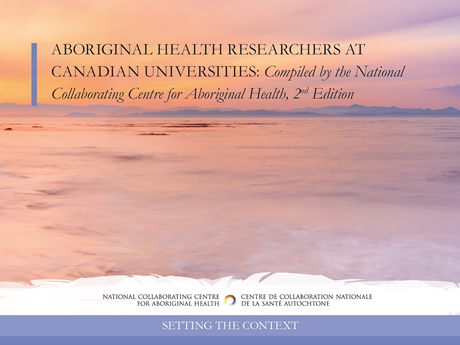Supporting Indigenous citational practices in academia and beyond
May 2019

The Indigenous Health Researchers Database was created to help identify researchers with expertise in a wide variety of topics related to the health of Indigenous (First Nations, Inuit and Métis) peoples in Canada. It includes researchers whose work focuses not only on physical health and illness, but also on the social, economic, cultural, environmental, political, and structural determinants that affect Indigenous peoples’ health and well-being. Originally compiled in 2014, and available as a PDF, Aboriginal Health Researchers at Canadian Universities1 became a digitized online resource in 2017. To ensure the database remains a relevant, accurate resource, it is routinely updated.
To be included in this database, researchers must:
- Have at least one Indigenous health publication released since 2014.
- Be affiliated with a Canada university, including status as a faculty member, adjunct professor, clinical professor, professor emeritus, or director/researcher of a research institute affiliated with a Canadian university.
Researchers working in the field of Indigenous health were identified through a search of Google Scholar using the terms “Indigenous/Aboriginal/First Nations/Inuit/Métis/urban Aboriginal + health + Canada.” This search garnered a wealth of literature related to the health and well-being of Indigenous peoples and identified potential researchers. For each of these researchers, affiliation with a Canadian university was confirmed and contact information was collected from university websites. Google Scholar was then used to identify some samples of relevant research for each researcher published since 2014. Researchers were contacted by email to obtain their consent to be included in the database and confirm the accuracy of the information that would be included. Researchers who self-identified as First Nations, Inuit or Métis were also invited to have this information added to their profile.
The database is searchable by topic or by Indigenous population. The search by topic tool is accessible via a drop-down menu of common search terms. These terms were derived from researchers’ lists of interests, standardized to improve searchability, including replacement of all references of ‘Aboriginal’ to ‘Indigenous’, with the exception of publication names. The “Indigenous population” search tool consists of a drop-down menu of five Indigenous population categories: an Indigenous (general) category to encompass research not related to any specific Indigenous cultural group or is applicable across all Indigenous populations, and four categories to encompass First Nations, Inuit, Métis, and urban Indigenous populations specifically. As some researchers have published research related to the health of multiple Indigenous populations, they are cross-listed in all relevant population categories. Researchers were not required to have a recent publication in each of the population categories in order to be included in that population category; they were only required to have a recent publication in one of the categories for which they have been included.
If you would like to be included in the database, provide any updates to your current profile, or present any feedback about the database in general, please contact the National Collaborating Centre for Indigenous Health at nccih@unbc.ca
Additional resources:
1 National Collaborating Centre for Aboriginal Health (2014). Aboriginal Health Researchers at Canadian Universities: Compiled by the National Collaborating Centre for Aboriginal Health, 2nd Edition. Prince George, BC: National Collaborating Centre for Aboriginal Health.